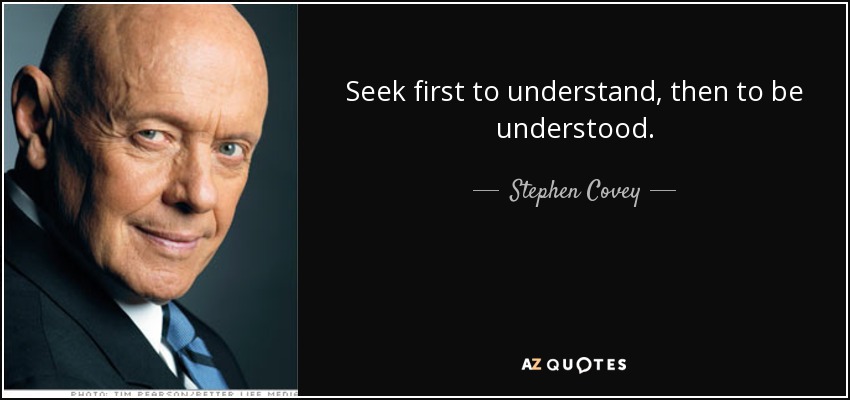Click here to return to Blog Post Intro

Proverbs 18:13 says, “To answer before listening—that is folly and shame.” And James 1:19 says, “Everyone should be quick to listen, slow to speak…”
Listening is a particularly apt word for a discussion of the art of communication. Hearing is a natural function and something we sometimes work hard not to do. Hearing deals with noise; listening deals with meaning. Researchers tell us we have to expend effort to really listen. We have to want to listen.
Many leaders spend vast amounts of time and energy developing skills such as strategic thinking, time management, and public speaking. But what about taking time to develop the skill of listening? If you want to be an Out of This World Leader, you’ll develop this skill and practice techniques, such as maintaining eye contact and rephrasing what you hear to be certain you have good understanding.
Speaking
Closely tied with the skill of listening is the ability to express oneself in an affirming manner. After all, “the words of the reckless pierce like swords, but the tongue of the wise brings healing.” (Proverbs 12:18)
In Matthew 15:18, Jesus says, “The things that come out of a person’s mouth come from the heart.” James echoes a similar sentiment. In James 3:8, he notes that “no human being can tame the tongue.” It will speak out of what fills the heart. Both James and Jesus teach that communication is as much an issue of character (see my previous post on Got Character?) as skill.
Achieving Understanding
The real purpose of communication is neither to speak nor to listen, but rather to achieve greater understanding. In Isaiah 6:9, God told Isaiah, “Go and tell this people. Be ever hearing, but never understanding; be ever seeing, but never perceiving.” God forewarned Isaiah at his commissioning that he would face communication problems throughout his ministry. The people would hear his message, yet they wouldn’t understand it.
True communication has not occurred until meaning is established and understanding taken place. Here are some principles Mike Myatt offers from “10 Communication Secrets of Great Leaders”:
- “Have an open mind.” Myatt explains that “leaders take their game to a whole new level the minute they willingly seek out those who hold dissenting opinions and opposing positions with the goal of not convincing them to change their minds, but with the goal of understanding what’s on their mind.”
- “Shut-up and Listen.” Enough said.
- “Replace ego with empathy.” Myatt writes, “When candor is communicated with empathy and caring and not the prideful arrogance of an overinflated ego, good things begin to happen.”
- “Read between the lines.” “Take a moment and reflect back on any great leader that comes to mind…they…have the uncanny ability to understand what is not said…everyone seems to be in such a rush to communicate what’s on their mind that they fail to realize everything to be gained from the minds of others.”
Your ability to communicate will either evoke trust or distrust in those you lead. It will determine to a large extent how eagerly your followers will follow you.
What is one thing you can do today to strengthen your ability to listen, as you shoot for the stars?



